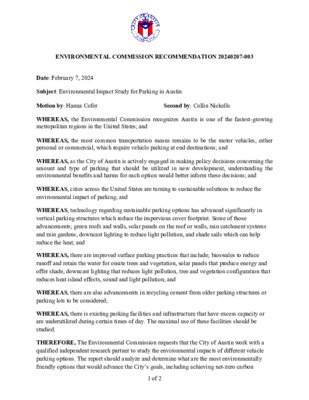20240207-003: Parking Study Recommendation — original pdf
Recommendation

ENVIRONMENTAL COMMISSION RECOMMENDATION 20240207-003 Second by: Collin Nickells Date: February 7, 2024 Subject: Environmental Impact Study for Parking in Austin Motion by: Hanna Cofer WHEREAS, the Environmental Commission recognizes Austin is one of the fastest-growing metropolitan regions in the United States; and WHEREAS, the most common transportation means remains to be the motor vehicles, either personal or commercial, which require vehicle parking at end destinations; and WHEREAS, as the City of Austin is actively engaged in making policy decisions concerning the amount and type of parking that should be utilized in new development, understanding the environmental benefits and harms for each option would better inform these decisions; and WHEREAS, cities across the United States are turning to sustainable solutions to reduce the environmental impact of parking; and WHEREAS, technology regarding sustainable parking options has advanced significantly in vertical parking structures which reduce the impervious cover footprint. Some of those advancements; green roofs and walls, solar panels on the roof or walls, rain catchment systems and rain gardens, downcast lighting to reduce light pollution, and shade sails which can help reduce the heat; and WHEREAS, there are improved surface parking practices that include; bioswales to reduce runoff and retain the water for onsite trees and vegetation, solar panels that produce energy and offer shade, downcast lighting that reduces light pollution, tree and vegetation configuration that reduces heat island effects, sound and light pollution; and WHEREAS, there are also advancements in recycling cement from older parking structures or parking lots to be considered; WHEREAS, there is existing parking facilities and infrastructure that have excess capacity or are underutilized during certain times of day. The maximal use of these facilities should be studied. THEREFORE, The Environmental Commission requests that the City of Austin work with a qualified independent research partner to study the environmental impacts of different vehicle parking options. The report should analyze and determine what are the most environmentally friendly options that would advance the City’s goals, including achieving net-zero carbon 1 of 2 emissions in the Climate Equity Plan, Austin’s Strategic Mobility plan, SOS ordinance, and the city ordinance to eliminate parking from commercial developments. When assessing environmental impacts, the Commission asks that the study include a Life Cycle Assessment that considers all necessary raw material extraction and processing, manufacturing, distribution, use, and final disposal of materials, as well as other considerations including but not limited to its ability to capture/treat stormwater, associated heat island effects, light pollution, and any other environmental impacts. Public input should be gathered by well- publicized public meetings, using broadly recognized scientific methods to ensure the data is representative to all the residents of Austin and Travis County as well as visitors, to determine the types of parking options people prefer. The Environmental Commission desires this report to be a tool for city staff, public space planners, and developers to determine what parking options are environmentally superior in; reducing impervious cover, reducing pollution from runoff during rain events, reducing heat island effects, reducing light pollution, and increasing solar energy use. The Commission requests that this study be completed and presented to the Environmental Commission in June 2025, to the Joint Sustainability Committee and Urban Transportation Commission (as requested), and to Austin City Council no later than September 2025. Vote: 9-1 For: Bedford, Brimer, Bristol, Cofer, Einhorn, Nickells, Qureshi, Ramberg, Sullivan Against: Krueger Abstain: None Absent: Schiera Attest: Kevin Ramberg, Environmental Commission Chair 2 of 2